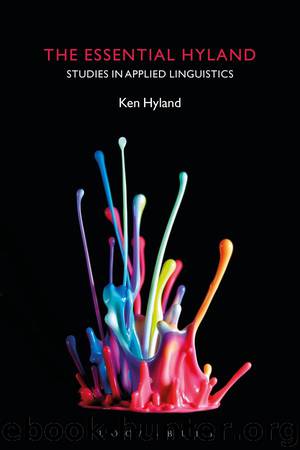The Essential Hyland by KEN HYLAND

Author:KEN HYLAND
Language: eng
Format: epub
Publisher: Bloomsbury Publishing Plc
Some observations and directions
Acknowledgements are sophisticated and complex textual constructs which bridge the personal and the public, the social and the professional, and the academic and the lay. Their widespread use in postgraduate dissertations across different fields reflects their importance to students and underlines their considerable significance in scholarly discourse. This is perhaps the most explicitly interactional genre of the academy, one whose communicative purpose virtually obliges writers to represent themselves more openly. It is also a genre which allows readers to peer behind the carefully constructed façade of research texts to see a human writer with a real identity enmeshed in a network of personal and academic relationships. Here the writer can present a self disentangled from the complex conventions of powerful academic discourse types and reveal a real individual coping with the perplexing demands of research and overcoming a myriad of contingent issues which conspire to overwhelm the project.
Yet despite this relaxation in the authorial roles, purposes, and writer-reader relationships of the research genre, the choices available to writers of acknowledgements are not entirely arbitrary. Acknowledgements are not mere lists of thanks to a random group of people for miscellaneous services. There are clear patterns in the texts and discernable constraints acting on their writers. As in the dissertation proper, the problem for students is to demonstrate an appropriate degree of competence and intellectual autonomy while recognizing readers’ greater experiences, knowledge of the field, and influence over the fate of the text. As a result, acknowledgements can play an important rhetorical role in promoting a competent, even rhetorically skilled, scholarly identity while signaling important professional connections and relationships as well as the valued disciplinary ideals of modesty, gratitude, and appropriate self-effacement.
The analysis suggests that the textualization of gratitude reveals social and cultural characteristics, an intimation of disciplinary specialization within a broad generic structure. It remains to be seen whether there are distinct Hong Kong features at work here but, much like the dissertation itself, disciplinary field rather than national characteristics is likely to be the strongest determinant of the shape this genre takes (Johns & Swales, 2002). The public display of thanks is shaped by larger forces and interests than simple thanks and is mediated by disciplinary preferences, personal gratitude, and strategic career choices. We can see here one way which postgraduate writing represents a situated activity. Writing a dissertation does not stand alone as the discrete act of a writer but emerges as a stream of activity which weaves together the personal, the interpersonal, and the institutional, and which often continues beyond the completion of the text, through the patronage and loyalty signaled in this genre, to a future career.
Acknowledgeme nts, then, are intimations of the shared ways of understanding experience, representing a window into the personal worlds of student writers and the processes of engaging in the disciplines. In these texts, we glimpse students’ disciplinary life-worlds, the ways their experiences of community work patterns and organizational affiliations are reflected in those they choose to recognize and what they recognize them for.
Download
This site does not store any files on its server. We only index and link to content provided by other sites. Please contact the content providers to delete copyright contents if any and email us, we'll remove relevant links or contents immediately.
Cecilia; Or, Memoirs of an Heiress — Volume 1 by Fanny Burney(32550)
Cecilia; Or, Memoirs of an Heiress — Volume 2 by Fanny Burney(31950)
Cecilia; Or, Memoirs of an Heiress — Volume 3 by Fanny Burney(31933)
The Lost Art of Listening by Michael P. Nichols(7498)
Asking the Right Questions: A Guide to Critical Thinking by M. Neil Browne & Stuart M. Keeley(5765)
We Need to Talk by Celeste Headlee(5609)
On Writing A Memoir of the Craft by Stephen King(4937)
Dialogue by Robert McKee(4390)
Pre-Suasion: A Revolutionary Way to Influence and Persuade by Robert Cialdini(4225)
I Have Something to Say: Mastering the Art of Public Speaking in an Age of Disconnection by John Bowe(3884)
Elements of Style 2017 by Richard De A'Morelli(3343)
The Book of Human Emotions by Tiffany Watt Smith(3305)
Fluent Forever: How to Learn Any Language Fast and Never Forget It by Gabriel Wyner(3079)
Name Book, The: Over 10,000 Names--Their Meanings, Origins, and Spiritual Significance by Astoria Dorothy(2984)
Good Humor, Bad Taste: A Sociology of the Joke by Kuipers Giselinde(2945)
Why I Write by George Orwell(2945)
The Art Of Deception by Kevin Mitnick(2800)
The Grammaring Guide to English Grammar with Exercises by Péter Simon(2741)
Ancient Worlds by Michael Scott(2682)
